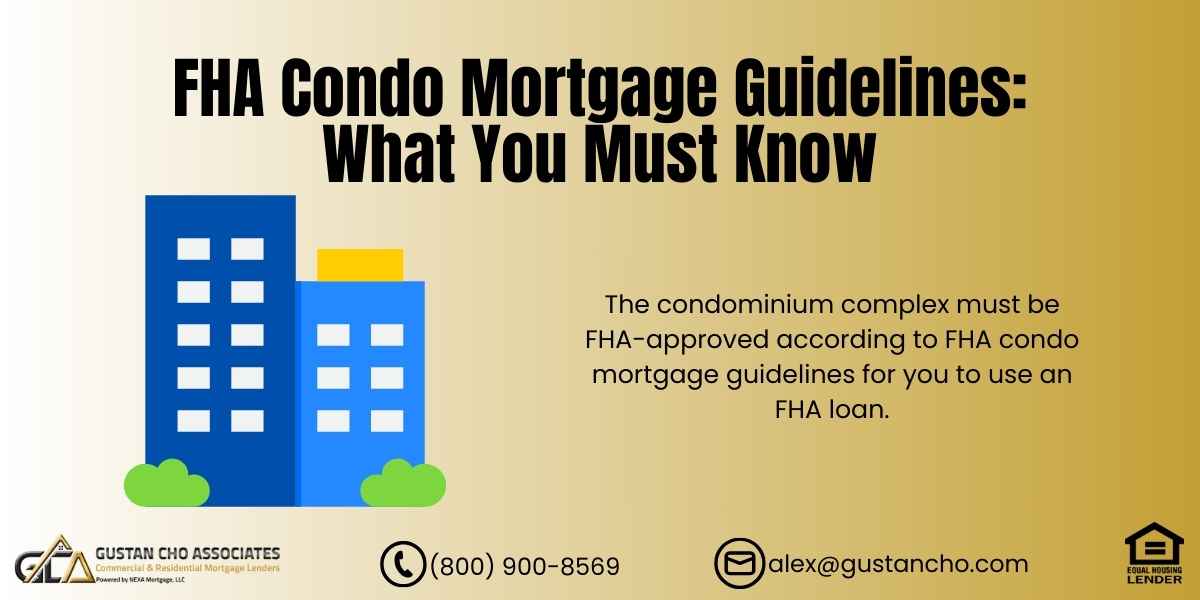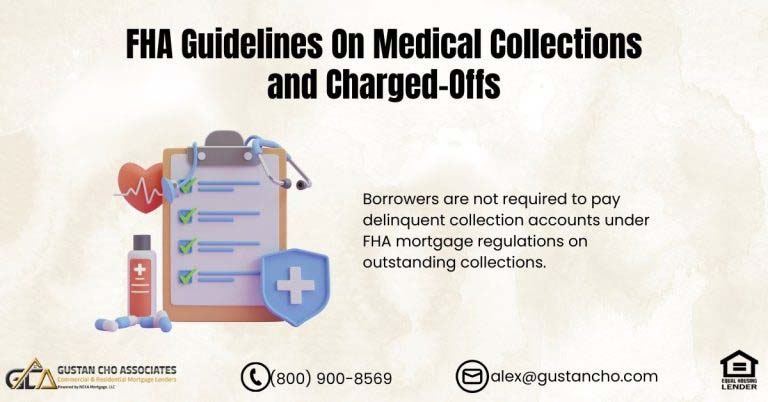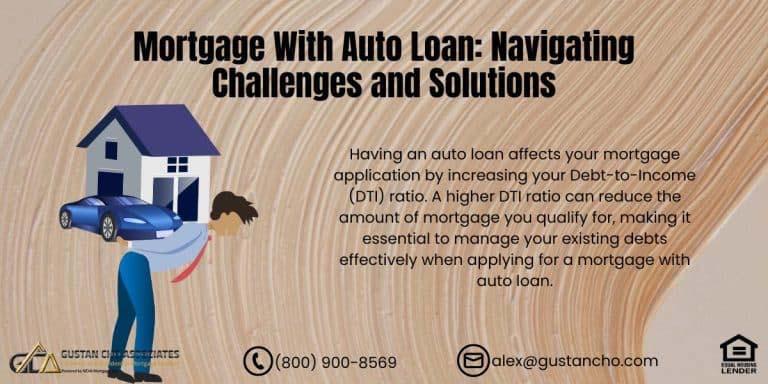For many homebuyers, buying a condo can be an excellent option due to its combination of affordability, convenience, and a sense of community. But if you’re considering using an FHA loan to finance your condo purchase, there’s a catch: the condo complex must be FHA-approved. Understanding the FHA condo mortgage guidelines is crucial to ensure your dream condo is within reach.
This updated guide will walk you through everything you need about FHA condo mortgage guidelines . For an individual purchasing a home for the first time or seeking to refinance, this manual will assist you in confidently maneuvering through the process.
Why Choose an FHA Loan for Your Condo?
Thinking of buying a condo with a bit of help? FHA loans could be your ticket. They’re chill with who they lend to, which is great news for many of us. Here’s the lowdown:
- Low Down Payment: You could snag a condo with just 3.5% down with an FHA loan. That’s super handy if you don’t have a huge savings pile. Just make sure your credit score is sitting at 580 or better.
- Lenient Credit Score Requirements: FHA’s got you. They’re way more forgiving than most, opening the door to homeownership even if you’ve hit some bumps in the road, like bankruptcy or foreclosure, in the past.
- Flexible Debt-to-Income Ratios: FHA loans are still within reach if you’re juggling some debt. They’re more flexible about how much debt you can have compared to what you earn, compared to the stricter rules of conventional loans.
But hold up, there’s a catch – the dream condo you want to buy must be on the FHA-approved list. If it’s not, you’ll need to look at other options. This rule is part of the FHA condo mortgage guidelines. So, before you set your heart on a place, check if it meets the guidelines to avoid any heartache later!
The Federal Housing Administration (FHA) has changed its condominium mortgage policies to make them more user-friendly and flexible for potential homebuyers. The goal is to simplify the process of getting condominium units, particularly those using FHA-insured loans.
Key Updates to FHA Condominium Mortgage Guidelines
Single Unit Approval (SUA):
Overview:
- This was created to permit individual units in non-FHA-approved condo projects to qualify for FHA-insured financing.
Eligibility Criteria
Project Size:
- Projects with 10 or more units must have at least 10 percent qualified for FHA insurance, and projects with less than 10 units must have at least one qualified unit.
Project Status:
- Complete and fully compliant with applicable state law requirements.
Occupancy Requirements:
- A minimum of 50 percent of units must be owner-occupied.
Financial Stability:
- The project must have sufficient reserves and less than 15 percent delinquent HOA units to prove financial health.
Owner Occupancy Ratio
Standard Requirement:
- At least 50 percent of units must be owner-occupied.
Exceptions:
- Some projects may qualify with a lower owner occupancy ratio if they meet certain financial and operational criteria.
Commercial Space Allowance
Increased Limit:
- The proportion of commercial/non-residential space incorporated in a condominium project can now be up to 50% of the total floor area, facilitating mixed-use developments available for FHA approval.
Recertification of Condo Projects
Extended Approval Duration:
- The certification period for approved condominium projects is now three years, reducing the frequency of recertification and the associated administrative burden.
Streamlined Application Process:
Simplified Documentation Efforts have been made to streamline the process of gaining approval for a project, such as simpler documentation and clearer instructions that ensure compliance with regulations.
Implications for Home Buyers and Developers:
Increased Access:
- These changes aim to enable prospective buyers to access suitable housing options in condominium projects.
- This is especially true in markets where these types of properties are abundant.
Encouragement for Development:
- Developers may be more inclined to add residential and commercial space to their projects, knowing that the increased allowance for commercial space will still satisfy FHA approval.
Simplified Financing:
- The single-unit approval process allows buyers to obtain FHA-insured financing for units in projects without going through a full project approval process, widening the range of available properties.
The HUD’s FHA-approved condominium search tool can be useful for checking whether a project is FHA-approved or obtaining further details.
These updates show the FHA’s efforts to change its policies by changing the housing market, enabling more Americans to achieve homeownership across different properties.
Understanding FHA Condo Mortgage Guidelines
Suppose you’re thinking about buying a condo with an FHA loan. In that case, there’s some important information about FHA condo mortgage guidelines to ensure you and the place you’re picking are both a good fit. So, let’s break it down into easy bits:
The Condo Must be FHA-Approved
First things first, the condo has to be on the FHA’s good list. This means the whole place, not just the unit you’re eyeing, needs a thumbs up from HUD, the folks in charge of this. Before you fall in love with a spot, check if it’s FHA-approved. This approval is only for a while; it needs renewing, and sometimes, buildings forget to update it.
What if the Condo isn’t FHA-Appoved?
Ran into a condo that’s perfect but not FHA-approved? You’ve got a couple of paths:
- Look for a Conentional Loan: Conventional means using a regular loan, which might ask for a higher credit score or more cash upfront but doesn’t fuss about FHA approval.
- Consider Getting the Condo Approved: This one’s more about waiting. The condo’s HOA or the people who built it can request approval. It could take a bit, like up to 90 days, and you can’t do this part— it’s on them.
FHA Loan Requirement for Condos
To match up with FHA’s rules, apart from the condo being okayed, you’ve got to check some boxes too:
- Minimum Credit Score: Aim for 580 or higher for a smaller down payment. Under 580, and you’re looking at putting down more cash.
- Debt-to-Income Ratio (DTI): This is all about how much debt you have versus how much you make. FHA loan is pretty cool here, letting you go up to 43-50% DTI.
- Occupancy: You’ve got to make the condo your main hangout spot.
Special Considerations for New Construction Condos
Eyeing a brand-new condo? Wait until half the units are sold and most are lived in by their owners before FHA says it’s a go.
VA-Approved Condos and FHA Loans
VA-approved condos can often get FHA approval more easily. If the condo is already VA-approved, the process may be faster.
These points should help you navigate the FHA condo mortgage guidelines and get closer to snagging your dream spot.
FHA vs. Conventional Loans for Condo Purchases
When thinking about getting a mortgage for a condo, many people wonder whether they should go with an FHA loan or a conventional loan that’s not connected to the government, often called a conventional loan. Let’s break it down in simple terms, especially focusing on the FHA condo mortgage guidelines.
FHA Loans – The Friendly Helper
- If your credit score isn’t top-notch, don’t sweat it. FHA loans are more forgiving.
- Got a little saved up? Cool, because you only need 3.5% of the condo’s price as a down payment if your credit score is smiling at 580 or more.
- A bit heavy on debt? FHA loans are lenient, allowing you to have higher debt compared to your income.
- The catch? Your dream condo needs a special thumbs-up from the FHA.
Conventional Loans – The Strict Sibling
- These loans need you to have a better credit score, usually 620 or more. They like seeing you’re good with money
- They keep a tighter leash on how much debt you can carry.
- You’ll need more cash upfront—usually 5-20% for a down payment, depending on who’s lending you the money.
- The freedom factor? There is no need for the condo to pass any special FHA approval.
So, if the FHA doesn’t approve the condo you’ve got your eye on, you’ll be looking at a conventional loan as your path. Getting approved for an FHA loan might be easier than getting approved for a conventional loan. Remember, everyone’s situation is a bit different, so it’s wise to chat with a mortgage pro or lender to figure out what best suits you regarding FHA condo mortgage guidelines and all the other details.
How to Get a Non-FHA Approved Condo FHA Approved
If you’ve found the perfect condo, but it’s not FHA-approved, don’t give up just yet. Here’s what you can do:
- Contact the HOA or Developer:
- The condo’s Homeowners Association (HOA) or developer must apply for FHA approval. This involves submitting documents, paying fees, and meeting HUD’s requirements.
- Provide Necessary Documentation:
- The condo complex will need to submit the following:
- Legal Documents: Condo association bylaws and rules.
- Financials: Operating budget, reserve funds, and financial statements.
- Occupancy Rates: At least 51% of the units must be owner-occupied.
- Insurance: The complex must have adequate insurance coverage.
- The condo complex will need to submit the following:
- Wait for Approval:
- The process typically takes 30-90 days. Once approved, all units in the complex are eligible for FHA financing.
How Mortgage Lenders View Condos
When you’re looking into buying a condo and want a loan, lenders often see it as a bit more of a gamble than getting a house. Here’s what’s going on:
- Higher Interest Rates: You might pay a bit more in interest rates if you buy a condo.
- Tougher Approval Process: Getting a loan for a condo is more complex. Banks will dig into how the condo place is run, how many people actually live there vs. rent out, and other details.
- Market Value Impact: If some condos in the place are going back to the bank (foreclosures), that’s not good news for the value of your pad.
So, why all these checks? If you’re going with an FHA loan (a type of loan backed by the government to help you buy a place with less down), there are specific rules—FHA condo mortgage guidelines. They’re picky about where they put their money, which makes sense. They usually want to see that the condo place is on solid financial footing, most units are owned by people living in them (not renting out), and there’s no big legal stuff hanging over the property.
In summary, picking a well-maintained condo that checks the right boxes can make it easier to get your loan approved.
FHA Loans After Bankruptcy and Foreclosure
FHA loans are a good pick if past money troubles like bankruptcy or foreclosure are a part of your history. They’re a bit more easy-going than regular loans from banks:
- Bankruptcy: If you’ve filed for Chapter 7 bankruptcy, you must wait two years before applying for an FHA loan.
- Foreclosure: Had a foreclosure, a short sale, or a deed in lieu of foreclosure? You’ll need to wait three years before you’re eligible for an FHA loan.
It’s good to know that FHA rules are more relaxed, especially when trying to get back on your feet financially. And if you’re looking at buying a condo, the FHA condo mortgage guidelines are part of the flexible terms that make FHA loans a solid choice for borrowers working on improving their financial future.
FHA Approved Condos vs. Non-Approved
Apply Online And Get recommendations From Loan Experts
FHA Condo Mortgage Guidelines: What’s New?
FHA has made several updates to its guidelines to make it easier for more buyers to qualify:
- Increased Loan Limits: FHA loan limits have increased in many areas, giving buyers more purchasing power.
- Streamlined Approval Process: The FHA has simplified the condo approval process, reducing red tape and speeding up approvals.
- Expanded Manual Underwriting: More flexibility for borrowers with unique financial situations, such as those with non-traditional income sources.
Key Takeaways for FHA Condo Mortgage Guidelines
Here’s a quick recap of what you need to know:
- FHA loans are a great option for condo buyers, but the condo must be FHA-approved.
- If the condo isn’t approved, you may need to look into a conventional loan or see if the condo can become FHA-approved.
- New construction condos have additional requirements, including 51% unit sales and owner occupancy.
- FHA loans remain flexible, especially for buyers with past financial hardships.
Ready to Buy a Condo with an FHA Loan?
Whether you’re a first-time buyer or looking to refinance, FHA loans offer a path to condo ownership with more flexible guidelines than conventional loans. But remember, the condo must be FHA-approved. If you’re eyeing a condo that isn’t on the approved list, talk to your lender or the condo’s HOA about getting it approved.
Get Started Today
Don’t let the condo you want slip through your fingers. With the right guidance and a clear understanding of FHA condo mortgage guidelines, your dream of owning a condo can become a reality. Contact us today to get started on your journey to homeownership.
FAQs – FHA Condo Mortgage Guidelines: What You Must Know
- 1. What are FHA condo mortgage guidelines? FHA condo mortgage guidelines are rules set by the Federal Housing Administration that your condo must meet to qualify for an FHA loan.
- 2. Do all condos qualify for FHA loans? No, the condo complex must be FHA-approved according to FHA condo mortgage guidelines for you to use an FHA loan.
- 3. How do I know if a condo is FHA-approved? You can check if a condo is FHA-approved by searching the HUD-approved condo list. It’s important to ensure it meets the FHA condo mortgage guidelines.
- 4. What happens if the condo I want isn’t FHA-approved? If the condo isn’t FHA-approved, you can either look for a conventional loan or ask the HOA to get the condo approved according to FHA condo mortgage guidelines.
- 5. Can I get an FHA loan for a new construction condo? Yes, but 51% of the units in the new construction condo must be sold and occupied for the condo to meet FHA condo mortgage guidelines.
- 6. Why do FHA loans require the condo to be approved? FHA wants to ensure the condo complex is financially stable and well-maintained, so they have specific FHA mortgage guidelines.
- 7. Are interest rates higher for condos with FHA loans? Interest rates can be slightly higher for condos, but meeting FHA condo mortgage guidelines helps keep your loan affordable.
- 8. Can I buy a condo with bad credit using an FHA loan? Yes, FHA loans are more flexible with credit scores, but the condo must still meet FHA condo mortgage guidelines.
- 9. How long does it take to get a condo FHA-approved? It usually takes 30 to 90 days to get a FHA-approved condo if it meets all the FHA mortgage guidelines.
- 10. Can I refinance my condo with an FHA loan? Yes, as long as the condo meets FHA condo mortgage guidelines, you can refinance using an FHA loan.
If you have any questions about FHA condo mortgage guidelines, please contact us at 800-900-8569. Text us for a faster response. Or email us at alex@gustancho.com. The team at Gustan Cho Associates is available 7 days a week, on evenings, weekends, and holidays.
This blog about FHA Condo Mortgage Guidelines: What You Must Know was updated on February 19th, 2025.
Looking to Lower Your Mortgage Payments?
Apply Online And Explore FHA Condo Refinance Options










